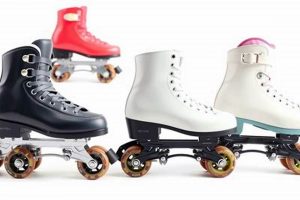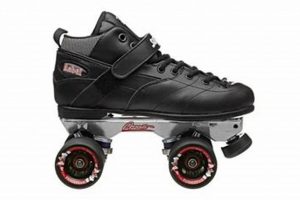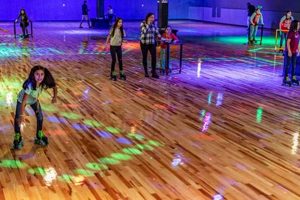The phrase represents a common user search query indicating a desire to locate nearby instructional services focused on the activity of roller skating. An individual using this search term is actively seeking opportunities to learn or improve their roller skating skills within a geographically convenient location. As an example, a person new to the sport or wishing to enhance their technique might type “roller skates lessons near me” into a search engine to find relevant local options.
Acquiring proficiency in roller skating offers numerous advantages, extending from physical fitness improvements, such as enhanced cardiovascular health and muscle strength, to the development of coordination and balance. Historically, roller skating has evolved from a recreational pastime to a competitive sport, offering individuals a diverse range of avenues for participation and skill development. The ability to readily access local instruction streamlines the learning process and encourages greater engagement with this activity.
The following sections will explore various aspects of finding appropriate skating instruction, including types of lessons offered, factors to consider when selecting an instructor, and the potential benefits of structured learning environments.
Guidance for Locating Local Roller Skating Instruction
The following points provide guidance for individuals initiating their search for nearby roller skating lessons. Considerations include assessment of personal skill level, instructor qualifications, and learning environment.
Tip 1: Define Skill Level: Accurately assess current roller skating capabilities. Beginning learners require fundamental instruction, while experienced skaters benefit from advanced technique refinement. Selecting instruction aligned with skill level optimizes the learning experience.
Tip 2: Research Instructor Credentials: Investigate the qualifications and experience of potential instructors. Certifications from recognized roller skating organizations or extensive coaching history are indicators of competence. Reviewing testimonials or seeking recommendations from other skaters provides additional insight.
Tip 3: Evaluate Class Structure: Determine preferred learning environment. Group lessons offer a social learning atmosphere, while private instruction provides personalized attention. Consider the class size and instructor-to-student ratio to ensure adequate individual guidance.
Tip 4: Assess Location and Accessibility: Evaluate the proximity and accessibility of potential lesson locations. Travel time and transportation options influence commitment and adherence to a learning schedule. Indoor facilities mitigate weather-related disruptions, while outdoor locations may offer a different experience.
Tip 5: Inquire About Equipment Requirements: Clarify equipment requirements before enrolling in lessons. Some instructors provide rental skates, while others require participants to bring their own. Ensure that personal skates fit properly and are in good working condition.
Tip 6: Confirm Insurance Coverage: Verify that the instruction provider carries adequate liability insurance. Roller skating inherently involves risk of injury, and appropriate insurance coverage protects participants in the event of an accident.
Tip 7: Inquire About Curriculum and Goals: Request details regarding the lesson curriculum and stated learning objectives. Structured lessons with clear goals promote efficient skill development. Understanding the planned progression allows learners to gauge expected outcomes.
Following these guidelines facilitates informed decisions when selecting local roller skating instruction, ensuring a positive and productive learning experience.
The final section will provide concluding remarks, summarizing the benefits of structured roller skating instruction.
1. Proximity
Proximity functions as a primary determinant in the utility of search queries such as “roller skates lessons near me.” The underlying assumption is that physical distance directly affects accessibility and convenience. Increased proximity correlates with reduced travel time and associated costs, facilitating greater participation. For example, a parent seeking skating lessons for a child is more likely to enroll the child in a program within a 5-mile radius compared to one 20 miles away, all other factors being equal. The reduced commute promotes consistent attendance and minimizes disruption to daily routines. Proximity, therefore, contributes significantly to the perceived value and ultimate adoption of available instructional services.
The influence of proximity extends beyond mere convenience. It can foster a sense of community engagement. Localized instruction often draws participants from the immediate surrounding area, creating opportunities for social interaction and networking among individuals with shared interests. Consider the formation of informal skating groups among students attending the same nearby lessons. This emergent community reinforces learning, encourages continued participation, and strengthens social bonds within the neighborhood. The localized nature of lessons directly contributes to these secondary benefits, making proximity a critical factor in overall program success.
In conclusion, the prioritization of proximity in searches for roller skating lessons reflects a practical understanding of logistical constraints and social dynamics. While other factors such as instructor qualifications and cost remain important, the convenience and community-building potential associated with geographically accessible instruction often hold significant sway in decision-making. Recognizing the importance of proximity enables service providers to optimize location strategies and tailor program offerings to better meet the needs of local populations. Overcoming the challenges relating to location might greatly affect and encourage the activity of roller skating for some one. This highlights the inherent interconnectedness between physical location and effective service delivery in the realm of recreational activities.
2. Instructional Level
Instructional level represents a critical determinant in the effective utilization of the search term “roller skates lessons near me.” The search phrase itself indicates a desire for instruction, and the suitability of any resulting lesson directly hinges on its alignment with the individual’s existing skating proficiency and learning goals. Misalignment results in inefficient learning, frustration, or even potential physical harm.
- Beginner Instruction
This level caters to individuals with no prior skating experience. Curricula typically focus on fundamental skills such as maintaining balance, basic gliding, stopping techniques, and safe falling procedures. Lessons emphasize safety protocols and building a foundational understanding of skating mechanics. In the context of “roller skates lessons near me,” a beginner benefits from close proximity to reduce anxiety and encourage consistent attendance.
- Intermediate Instruction
Intermediate instruction targets skaters who have mastered basic skills and seek to refine their technique and expand their repertoire. Lessons often incorporate more complex maneuvers, such as turns, crossovers, backward skating, and introduction to simple skating tricks. A key element at this level is developing control and agility. The geographic location of intermediate lessons, while still relevant, becomes slightly less critical as individuals demonstrate increased commitment to skill development.
- Advanced Instruction
Advanced-level instruction caters to experienced skaters aiming to achieve mastery in specific skating disciplines, such as roller derby, artistic skating, or speed skating. Curricula involve highly specialized training, performance optimization, and competitive strategies. Advanced lessons might be less readily available in immediate proximity, requiring skaters to travel further to access specialized coaching. The emphasis shifts from convenience to the quality and reputation of the instructor.
- Adaptive Instruction
This encompasses specialized instruction tailored to individuals with physical or cognitive disabilities. These lessons require instructors with specific training in adapting skating techniques and equipment to accommodate diverse needs. Finding adaptive instruction using “roller skates lessons near me” may present a challenge, as availability is often limited. Proximity may become secondary to the instructor’s qualifications and the availability of specialized facilities and equipment.
In summation, the effectiveness of a search for “roller skates lessons near me” is inextricably linked to the precise matching of instructional level to individual needs. While proximity remains a significant factor, particularly for beginner instruction, the importance of instructor expertise and specialized curricula increases as skaters progress to higher levels. Adaptive instruction presents unique challenges, often requiring a trade-off between proximity and specialized resources.
3. Instructor Expertise
The effectiveness of roller skates lessons, regardless of their geographical proximity, hinges significantly on the expertise of the instructor. While the phrase “roller skates lessons near me” emphasizes location, the quality of instruction dictates the actual value derived from those lessons. Inadequate instructor expertise can lead to the development of poor skating habits, increased risk of injury, and overall discouragement, negating the benefits of convenient location. Conversely, skilled instructors can accelerate learning, foster a positive training environment, and instill a lifelong appreciation for the sport. For example, a certified roller skating coach with years of experience might identify subtle flaws in a student’s posture that a less qualified instructor would overlook, leading to more efficient and safer skill progression. The geographic convenience of lessons becomes secondary if the instruction is subpar.
The importance of instructor expertise extends beyond technical proficiency. Effective instructors possess strong communication skills, the ability to adapt teaching methods to individual learning styles, and a comprehensive understanding of safety protocols. A knowledgeable instructor will be able to assess a student’s abilities accurately, set realistic goals, and provide constructive feedback. Furthermore, an experienced instructor can identify and address potential risks proactively, minimizing the likelihood of accidents. Consider the difference between an instructor who simply demonstrates a technique versus one who explains the underlying biomechanics and common pitfalls. The latter empowers students to understand and correct their own errors, fostering independent learning. Instructor experience can be validated through certification, years of experience, and testimonials from past students.
In conclusion, while proximity is a significant consideration in selecting roller skates lessons, instructor expertise represents a non-negotiable element for optimal learning outcomes. The perceived benefit of nearby lessons diminishes if the instruction is inadequate. Prospective students should prioritize researching instructor credentials, seeking recommendations, and observing lessons to ensure they receive high-quality training. The long-term benefits of skilled instruction far outweigh the short-term convenience of a geographically proximate but unqualified instructor. Ultimately, the phrase “roller skates lessons near me” should be understood as a starting point, not a definitive indicator of value. The quality of instruction is paramount.
4. Schedule Availability
Schedule availability constitutes a critical factor in translating the intent behind “roller skates lessons near me” into actionable participation. The mere existence of geographically proximate lessons remains insufficient without suitable time slots aligning with individual commitments. This aspect directly influences enrollment rates and sustained engagement in offered programs.
- Personal Time Constraints
Work schedules, academic obligations, family responsibilities, and existing extracurricular activities impose limitations on available time. Lessons offered during incompatible hours effectively negate the advantage of geographical proximity. An individual working standard daytime hours may find evening or weekend options the only viable alternatives. Similarly, students face constraints based on school schedules and homework demands. Without consideration of these personal time limitations, the utility of “roller skates lessons near me” diminishes substantially.
- Class Frequency and Duration
The frequency and duration of lessons impact schedule feasibility. Multiple lessons per week may prove challenging for individuals with packed schedules, even if the individual lesson times are nominally convenient. Conversely, infrequent lessons may hinder skill progression and reduce motivation. The optimal balance between frequency, duration, and individual schedules determines long-term adherence to the program. A compromise may involve less-frequent, longer lessons on weekends, providing concentrated instruction without disrupting weekday routines.
- Seasonal Variations
Seasonal fluctuations in availability present a further complication. School holidays, summer vacations, and changes in weather patterns can disrupt established schedules. Lessons offered consistently throughout the year may not align with individual travel plans or altered routines during these periods. Outdoor lessons may be subject to cancellation due to inclement weather, requiring flexible scheduling options. Program providers must anticipate and accommodate these seasonal variations to maintain consistent enrollment.
- Instructor Availability
Instructor availability may limit lesson scheduling. Even if lessons are located nearby and within a potential student’s available hours, a key or highly sought-after instructor’s limited availability might prevent enrollment. This factor is particularly acute when seeking specialized or advanced instruction. Resolving scheduling conflicts may require balancing student preferences with instructor constraints, often necessitating compromises on lesson frequency or duration.
The interaction between schedule availability and “roller skates lessons near me” underscores the need for flexible and adaptable program offerings. Providers maximizing enrollment will tailor schedules to accommodate diverse needs, including evening, weekend, and holiday options. Clear communication regarding scheduling changes and cancellation policies is essential for maintaining student satisfaction and promoting long-term engagement. The ultimate success of a “roller skates lessons near me” search depends on the convergence of proximity, instructional quality, and, critically, convenient scheduling.
5. Lesson Cost
The financial aspect represents a significant determinant in the feasibility of pursuing roller skates lessons identified through the “roller skates lessons near me” search query. While proximity and schedule convenience may be appealing, the associated cost functions as a gatekeeper, either enabling or preventing participation. Elevated lesson fees, irrespective of instructor qualifications or convenient location, may render such services inaccessible to individuals or families with limited financial resources. Conversely, perceived affordability may incentivize enrollment, even if the location is slightly less convenient or the instructor’s credentials are less extensive. The cost-benefit analysis performed by potential students directly influences the conversion rate from search query to active participation.
Variations in lesson cost arise from several factors, including instructor experience, facility amenities, group versus private instruction, and session duration. For instance, a certified roller skating coach offering private lessons in a state-of-the-art indoor facility will likely command higher fees than a less experienced instructor conducting group lessons in an outdoor park. These cost differentials necessitate careful consideration of individual budgetary constraints and learning priorities. A beginner seeking basic skills may find affordable group lessons sufficient, while an advanced skater aiming for competitive performance may justify the investment in pricier private coaching. The economic landscape of a particular area also contributes to price variation; urban centers typically exhibit higher costs compared to rural regions.
The practical significance of understanding the interplay between lesson cost and the “roller skates lessons near me” search lies in facilitating informed decision-making. Individuals should proactively research pricing structures, explore potential discounts (e.g., package deals, student rates), and compare options across multiple providers. Overlooking the financial dimension can lead to enrollment in unaffordable programs, resulting in financial strain and potential dropout. Recognizing lesson cost as an integral component of the “roller skates lessons near me” equation empowers individuals to align their skating aspirations with their economic realities, fostering sustainable participation and maximizing the return on their investment.
Frequently Asked Questions
The following section addresses common inquiries pertaining to locating and selecting suitable roller skates instruction in a specific geographic area.
Question 1: What constitutes a reasonable distance when searching for “roller skates lessons near me?”
The definition of “reasonable” is subjective and varies based on individual circumstances, transportation options, and schedule flexibility. Generally, a radius of 5-10 miles is considered proximate, facilitating consistent attendance. However, individuals prioritizing instructor expertise or specialized training may extend this range.
Question 2: How can instructor qualifications be verified when exploring “roller skates lessons near me?”
Instructor credentials can be verified through certification from recognized roller skating organizations, review of coaching experience, and solicitation of testimonials from past students. Direct observation of teaching style provides further insight.
Question 3: What are the typical costs associated with roller skates lessons identified via “roller skates lessons near me?”
Lesson costs vary significantly based on instructor expertise, facility amenities, session duration, and group versus private instruction. Researching pricing structures and comparing options across multiple providers is recommended.
Question 4: Are roller skates provided, or must participants bring their own when attending “roller skates lessons near me?”
Equipment requirements vary. Some instructors furnish rental skates, while others require participants to supply their own. Clarification of equipment needs is essential prior to enrollment.
Question 5: What safety precautions should be considered when participating in “roller skates lessons near me?”
Roller skating inherently involves risk of injury. Ensuring the instructor provides adequate safety instruction, verifying the availability of liability insurance, and wearing appropriate protective gear (helmet, knee pads, elbow pads, wrist guards) are crucial safety measures.
Question 6: How can the suitability of a specific “roller skates lessons near me” program be assessed prior to committing to a full course?
Requesting a trial lesson or observing an existing class provides opportunities to evaluate the instructor’s teaching style, the class structure, and the overall learning environment before making a long-term commitment.
The preceding questions and answers offer guidance for navigating the process of finding appropriate roller skating instruction. Diligent research and careful consideration of individual needs and circumstances are paramount.
The subsequent section will provide concluding remarks, synthesizing the key considerations outlined throughout this document.
Concluding Remarks
The exploration of “roller skates lessons near me” reveals a multifaceted decision-making process extending beyond simple geographical proximity. Instructor expertise, instructional level, schedule availability, and lesson cost each contribute significantly to the overall value proposition. A comprehensive assessment of these factors ensures alignment with individual needs and optimizes the potential for a positive and productive learning experience. The search phrase serves as an initial filter, but a thorough evaluation of qualitative and quantitative aspects is essential for informed selection.
Ultimately, the pursuit of local roller skating instruction represents an investment in personal well-being and skill development. By prioritizing comprehensive evaluation over superficial convenience, individuals maximize the likelihood of achieving their skating goals and fostering a lifelong appreciation for the sport. The future potential of roller skating remains dependent on the availability of accessible and high-quality instruction. Continued emphasis on these aspects will contribute to the growth and evolution of the roller skating community.



![Best Outdoor Roller Skate Wheels [Guide] & Reviews! Learn to Surf & Skate: A Beginner's Step-by-Step Guide Best Outdoor Roller Skate Wheels [Guide] & Reviews! | Learn to Surf & Skate: A Beginner's Step-by-Step Guide](https://universitysurfandskate.com/wp-content/uploads/2026/01/th-846-300x200.jpg)

![Best Papaison Roller Skates: [Buy Guide] Learn to Surf & Skate: A Beginner's Step-by-Step Guide Best Papaison Roller Skates: [Buy Guide] | Learn to Surf & Skate: A Beginner's Step-by-Step Guide](https://universitysurfandskate.com/wp-content/uploads/2026/01/th-829-300x200.jpg)

